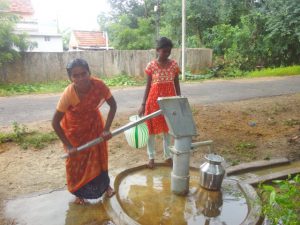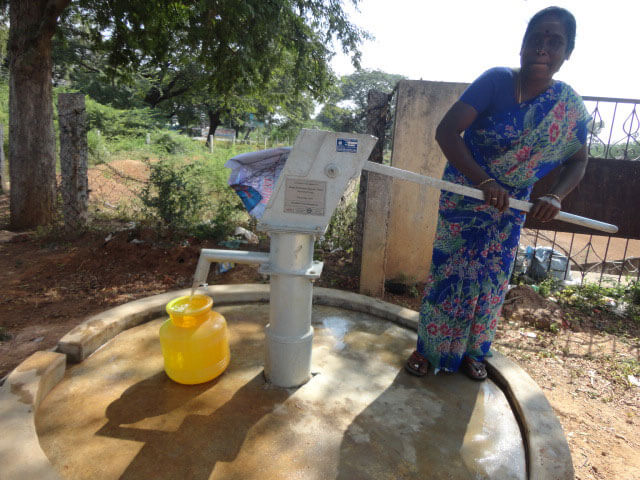Meet Rani
Providing clean drinking water by installation of hand pumps is seen as essential for survival in rural areas of India. Poverty and reduced access to safe water resources has limited the ability of the poor to improve their situation, which has only served to perpetuate the poverty cycle especially among rural women in India. All of our beneficiaries belong to the Dalit community, (backward class – a term coined by the Government) in the main they are landless and primarily engaged in menial work for survival. Hand operated pumps are the most viable solution due to the sporadic supply of electricity in the rural areas.
Meet Rani
Rani is a housewife, living in the hamlet of Nagappapatti in South India. She is part of a large family unit which includes her husband, in-laws, her children and wider members of the family. Her husband works in a small grocery stall in a nearby village.
The family household experiences serious hardship as weekly income, at best, is sporadic. There is an acute water shortage in this hamlet. The water situation prior to the bore well being installed was extremely poor and inadequate for the village community. The village is located in an extremely remote area. The villagers in the main are seasonal agricultural workers.
Rani walked 1.5 kilometers to fetch dirty pond water for her family needs. She performed this journey 3 times a day.
 The water pot weighed 20lbs when full. She spent the majority of her working day fetching water and had little time for her family. In addition to the hardship encountered, there was the added danger of poisonous snakes which inhabited the grassland she had to navigate through. Rani and fellow villagers had no choice but to endure this danger every time they made the journey for water. Furthermore the children in the family were constantly ill due to drinking polluted water.
The water pot weighed 20lbs when full. She spent the majority of her working day fetching water and had little time for her family. In addition to the hardship encountered, there was the added danger of poisonous snakes which inhabited the grassland she had to navigate through. Rani and fellow villagers had no choice but to endure this danger every time they made the journey for water. Furthermore the children in the family were constantly ill due to drinking polluted water.
Dysentery was prevalent and there was a constant battle to remain healthy.
The bore well has benefitted some 870 villagers and has changed their lives forever, bringing clean dependable drinking water to their doorsteps. Also the well has;
- reduced the drudgery of hauling water from ponds and rivers
- slashed the time it took to fetch daily water supplies for the respective households
- allowed greater time for more productive activities such as family life or securing a livelihood.
- dramatically reduced water-related diseases

The hand pump has been designed in a simple way therefore ensuring that the bore well can be easily operated and maintained by the villagers. The Foundation to date has installed 26 bore wells which in turn has changed the lives of more than 30,000 villagers.
When the well is dry, we learn the worth of water” ~ Benjamin Franklin
